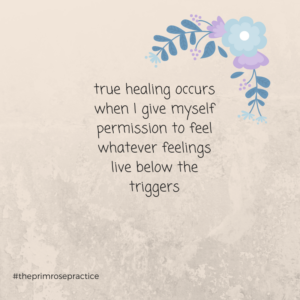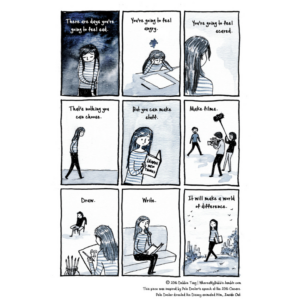Practical Ways to Cope with Anxiety.
If you struggle with anxiety and any other mental health related disorder, it can be like carrying a huge weight around with you all the time. That also goes for people with depression, borderline personality disorder, bipolar disorder, obsessive-compulsive disorder, and everything in between. Many people also don’t understand what you are going through which can make the burden even heavier and lonelier. Many of my patients wish there was a simple solution or a perfect medication that would take their symptoms away but the truth is, even when a medication does help, it rarely helps without the other actions that we must all take for daily well-being in a world that demands a lot from us.
In my own personal experience and through the experiences of my patients, I have seen people get steadily better by learning to manage their symptoms through behaviours and actions that they had some control over.
Here are 33 ways to manage anxiety. These things can help you whether you take medication or not.
- Get some exercise.Try to exercise at least 3 times a week. You probably don’t need to be told how important exercise is for both the body and the mind but the literature on the benefits of physical exercise on depression is extensive and the research publications are now pretty much all in accordance that physical exercise is at the very least important and beneficial as an adjunctive treatment, if not as a stand alone treatment, in the treatment of mild depression and anxiety. (Yael Netz: https://www.ncbi.nlm.nih.gov/pmc/articles/PMC5430071/)
- Practice meditation regularly.This is one of the most helpful tools to manage anxiety and especially when you are experiencing the symptoms particularly strongly. A good app like Headspace can offer guided meditations that will help and inspire you.
- Try to Get a good night’s sleep. Sometimes sleep is all it takes to get any emotional problems you may be suffering under control. For sleep troubles here is a youtube guided sleep hypnoses that works wonders.
- Try talking to someone who will understand.Talking through your feelings with someone who you trust and who understands can help immensely. Withdrawing into our own heads further can make the symptoms worse.
- Be mindful of your triggers.If you don’t know what they are, try to pay attention to what things seem to regularly cause anxiety for you. Start to keep a diary to pay attention to the patterns of your anxiety, which will help you feel more in control.

- Eat a healthy diet.It’s important what and how much you put into your body.
- Try to not to control your anxiety too much,the more you focus on your anxiety and try to control it, the worse it can get. For those of us struggling with anxiety, one of the biggest challenges is just learning how to tolerate it until it passes.
- Try to find ways to get into a more positive mindset. Use inspiration boards that you have created with inspirational quotes and images to break the cycle of negative or ruminating thoughts.
- Try to do some self-therapy. Here is a great workbook that you can work on yourself.
- Keep a journal.Writing down your thoughts and feelings really helps. It’s also helpful to try to always keep your journal with you so you have it whenever you need it.
- Monitor your alcohol consumption. Try not to abuse any substances because that’s a quick way to feed your anxiety. Even small amounts of alcohol can lead to sleep issues as well as depression and anxiety.
- Spend some time outside.Take a walk, sit outside and read, draw or just relax. Sometimes the hardest part is just fighting past the mental blocks that stop us from just doing it.
- Spend time developing a hobby. This is a great way to relax and distract yourself from anxiety.
- Try not to avoid the things that scare you.Challenging yourself and stepping out of your comfort zone can be one of the most helpful things for anxiety. But don’t bite off more than you can chew; you don’t want to make things worse. Challenge yourself in small steps and be patient. This is the basis of exposure therapy one of the most effective treatments for phobias. Although counterintuitive, we work on our fears by facing them.
- Don’t continue to only focus on the bad things. This can be hard due to our natural negativity bias so actively focusing on gratitude needs to become a practice, it won’t just come naturally!
- Read books, blogs, and anything else you can about anxiety.This is comforting; it helps you feel understood and realize that you’re not alone. Plus, it helps you understand the condition better. There are often book reviews on this blog so keep a look out.
- Consider going to therapy or counseling.Talking about your problems and getting to the root of them can help. Remember that anxiety can be a symptom of unexpressed emotions. Keep in mind that anxiety among expats is common due to the unstable nature of moving to another country. Finding an English speaking psychotherapist or a psychotherapist that speaks your language can be crucial.
- Practice mindfulness.This is a great way to manage your anxiety. Being mindful allows you to live in the present moment instead of living in the past or being fearful for the future. If you want a good book for discovering mindfulness, I have two suggestions that helped me a lot: ‘Full Catastrophe Living’ and ‘A Path With Heart’.
- Spend some time investing in yourself.Learn something new. Have you been wanting to learn a new language, learn a creative skill, or start a business? Then spend the time (and/or money) on learning it! Read a book, take a course, or whatever else you need to do.
- Lend a helping hand.Volunteering in your community is a great way to connect with others as well as integrate into a new culture. You could offer to babysit for free for a single mother or help at a local animal shelter. Service is an important part of developing meaning in life.
- Avoid over thinking.Overthinking about negative things doesn’t help anything. All it does is overwhelm our mind and it can definitely cause anxiety. Instead, try visualizing positive things and break the cycle of negativity.
- Do some art journaling. It can increase your focus and your creativity and it can calm you and relieve your stress. This comic strip by the wonderful Debbie Tung sums it up.

- Drink plenty of water.Along with all of the other problems dehydration can cause, lack of water can affect your anxiety so make sure you stay hydrated.
- Practice yoga regularly.Yoga is very helpful in relaxing your body and mind. It has many other benefits too, and it only takes a few minutes a day. Yoga with Adriene is a great free yoga resource on Youtube.
- Limit your time on social media.Studies have shown that spending time on social media can raise a person’s levels of anxiety. If you feel like this happens to you, then limit your time on these sites or delete your profile altogether.
- Use positive self-talk.When you suffer from anxiety, you probably hear a lot of negative talk in your head. Instead of listening to these thoughts, flip them around and try to use positive self-talk instead.
- Plan ahead.I know this one is something that freelancers can definitely relate to. Develop a plan of your day and week and stick to it. This stops the build up of an inflated to-do list which can make us feel overwhelmed and anxious.
- Use the RAIN technique (Recognize, Accept, Investigate and Non Identification). If you’re having a panic attack (or any other symptom of anxiety) remind yourself that this has happened to you before, it’ll pass, and you’ll be okay. Sometimes that’s all it takes to calm yourself down. Remember the steps with this acronym: RAIN.
- Use essential oils for self soothing. Stimulating our senses can be a useful way to distract the brain from anxiety. Using essential oils to calm and bring pleasure can work wonders for anxiety. Especially helpful is lavender.
- Set yourself goals.Setting yourself goals (even small ones) and taking steps to work towards achieving them can help lessen your anxiety. This gives you something to work towards and helps you feel better about yourself.
- Develop a self-care routine. Self-care is super important when it comes to anxiety. Developing a self-care routine is very effective because routines are comforting to anxiety-ridden minds. We will be hosting some English speaking groups at The Primrose Practice specifically for self-care so stay posted.
- Take a break.Let yourself off the hook once in a while. On your bad days, give yourself permission to sit around in your pajamas and relax if you need to.
- Develop a warrior attitude.You are the hero or heroine of your own story and sometimes the best we can do is to fight through it. Who are some of your favourite warriors? Draw on them to guide you through the dark times and believe that you have the strength to push through.

